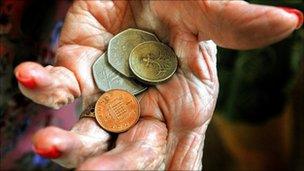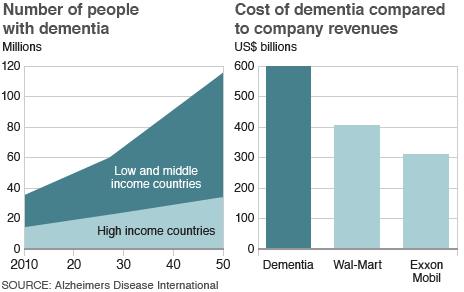Dementia cost 'to top 1% of GDP'
- Published

Dementia care costs are rising fast, says the report
The costs associated with dementia will amount to more than 1% of the world's gross domestic product this year at $604bn (£388bn), a report says.
The World Alzheimer Report says this is more than the revenue of retail giant Wal-Mart or oil firm Exxon Mobil.
The authors say dementia poses the most significant health and social crisis of the century as its global financial burden continues to escalate.
They want the World Health Organization to make dementia a world priority.
Campaigners say more investment in dementia care and research into new treatments is needed. Spending more money now would save nations more money in the future by decreasing the disease burden, they say.
A large part of the problem is people living longer - as life expectancy goes up around the world there will be more people who will develop dementia.
'Substantial investments'
The number of people with dementia is expected to double by 2030, and more than triple by 2050.
But experts say the costs of caring for people with dementia are likely to rise even faster than the prevalence, especially in the developing world, as more formal social care systems emerge and rising incomes lead to higher opportunity costs.
Data from individual countries such as the UK suggests that dementia is already one of the costliest illnesses.

The report, external brings together the best available data and the most recent insights regarding the worldwide economic cost of dementia.
It calls on the World Health Organization to declare dementia as a world health priority.
Professor Martin Prince, of the UK's Institute of Psychiatry and who co-authored the report, urged nations to develop better plans for caring for the millions who have the disease.
"Governments must show greater leadership, working with all stakeholders, to drive solutions to the long term care issue."
Marc Wortmann, head of Alzheimer's Disease International, an umbrella group of organisations, said: "The scale of this crisis cries out for global action.
"History shows that major diseases can be made manageable - and even preventable - with sufficient global awareness and the political will to make substantial investments in research and care options."
Dementia experts say governments must lead the way in ensuring national dementia strategies are fully implemented and dementia research is given enough funding to find new tests, treatments and possibly a cure.
- Published21 September 2010